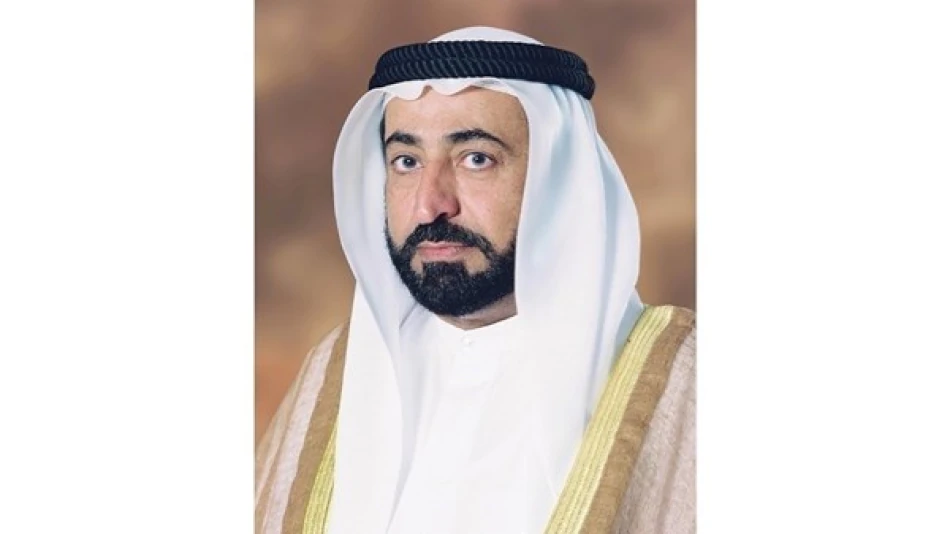
Sharjah Ruler Establishes Sharjah Hospitality Services Group Through Royal Decree
Sharjah Establishes Government-Backed Hospitality Empire to Challenge Dubai's Tourism Dominance
The Emirate of Sharjah has launched an ambitious bid to expand its hospitality sector through the creation of a comprehensive government-backed hospitality group, signaling a strategic pivot toward tourism revenues as Gulf states diversify their economies. The new entity, led by Sheikha Jawahir bint Mohammed Al Qasimi, consolidates existing facilities while positioning Sharjah to compete more aggressively with neighboring Dubai's tourism juggernaut.
Strategic Consolidation Under Royal Leadership
His Highness Sheikh Dr. Sultan bin Mohammed Al Qasimi, Ruler of Sharjah, issued a decree establishing the Sharjah Hospitality Group as an independent government entity operating under the Sharjah Family and Community Council. The move represents more than administrative restructuring—it's a calculated effort to professionalize and scale Sharjah's hospitality offerings under unified leadership.
The appointment of Sheikha Jawahir, wife of the Ruler, as chairperson underscores the strategic importance of this initiative. Her extensive experience in cultural and social development, combined with direct access to decision-making channels, positions the group for rapid expansion and policy alignment.
Broad Executive Powers Enable Rapid Growth
The decree grants the chairperson sweeping authority to establish, merge, or dissolve subsidiary entities, approve budgets, and create new administrative structures. This flexibility suggests Sharjah anticipates significant expansion beyond its current hospitality footprint, potentially through acquisitions or new developments.
Immediate Assets Signal Ambitious Scope
The group initially encompasses the Sharjah Ladies Club network and the Al Jawaher Reception and Convention Centre, but the decree's language indicates much broader ambitions. The provision allowing for "any other projects, facilities, or entities related to hospitality, wellness, and hotel services" to be added suggests Sharjah plans to build a comprehensive hospitality ecosystem.
This approach mirrors successful models in Singapore and the UAE's own Dubai Holding, where government-backed entities leverage public resources and policy coordination to compete with private sector hospitality giants.
Economic Diversification Through Tourism
The timing reflects broader Gulf trends toward tourism-driven economic diversification. While Dubai captured early-mover advantages in luxury tourism and business travel, Sharjah's cultural positioning and lower costs could attract different market segments—particularly cultural tourists and regional visitors seeking authentic Emirati experiences.
Revenue Streams Beyond Government Funding
The group's financial structure combines government allocations with commercial revenues, investment returns, sponsorships, and partnerships. This hybrid model reduces fiscal burden while maintaining government control—a balance other Gulf states have struggled to achieve in hospitality ventures.
The emphasis on partnerships with both government and private entities, domestically and internationally, suggests Sharjah recognizes it cannot build tourism infrastructure through public investment alone.
Regional Competition and Market Positioning
Sharjah's move comes as regional tourism competition intensifies. Saudi Arabia's massive tourism investments, Qatar's post-World Cup hospitality expansion, and Oman's boutique tourism strategy all target similar visitor demographics. However, Sharjah's proximity to Dubai International Airport and established cultural reputation provide competitive advantages.
The group's focus on professional standards and international best practices indicates awareness that government backing alone won't ensure success. The decree's emphasis on continuous performance monitoring and quality assurance suggests lessons learned from other state-led hospitality ventures that struggled with service standards.
Long-term Implications for UAE Tourism
This consolidation could reshape UAE's internal tourism dynamics. Rather than competing directly with Dubai's luxury positioning, Sharjah appears to be carving out complementary market space focused on cultural tourism, conferences, and regional hospitality services.
The success of this model could influence other emirates' tourism strategies, particularly as federal tourism coordination becomes increasingly important for maximizing the UAE's collective appeal to international visitors. If Sharjah successfully builds a profitable, government-backed hospitality portfolio, it may provide a template for smaller Gulf states seeking tourism diversification without massive private sector investment.
Most Viewed News

 Layla Al Mansoori
Layla Al Mansoori






